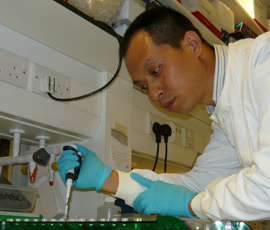
Dr Yong-Jie Lu in the laboratory
One man dies every hour from prostate cancer. After lung cancer, this disease is the second most common cause of death in men.
Now, a research team at Queen Mary, University of London has discovered that a high level of 'androgens' - chemically related male sex hormones that help the male reproductive system to function properly - trigger a specific genetic change in the prostate that can cause cancer to develop.
This genetic change is the fusion of an androgen-driving gene, with a tumour causing 'oncogene' gene. When these two genes fuse together they activate cancer development. This gene fusion is a major cause of prostate cancer and has been found in more than half of all prostate cancers.
Funded by the male cancer charity Orchid and the Medical Research Council (MRC), this new discovery reveals a critical understanding in the way prostate cancer develops but also presents an opportunity to prevent prostate cancer occurrence by learning how to control androgen levels.
Lead researcher Dr Yong-Jie Lu, from the Institute of Cancer, at Barts and The London School of Medicine and Dentistry, comments: "This is a significant discovery and a major breakthrough in the future prevention of the disease. If we can learn how to control and manage androgen levels, there is a strong possibility that we may be able to help thousands of men, especially those known to be at high risk from a family history of prostate cancer, from developing the condition all together."
Rebecca Porta, Chief Executive of Orchid comments: "Every year over 35,000 new cases of prostate cancer are diagnosed in the UK. Now, more than ever before we need to improve our understanding of this disease and to identify new ways to treat and manage it. The work of Dr Yong-Jie Lu is an important step in this direction. We are very pleased to be supporting his research programme."
Adapted from materials provided by Orchid.



